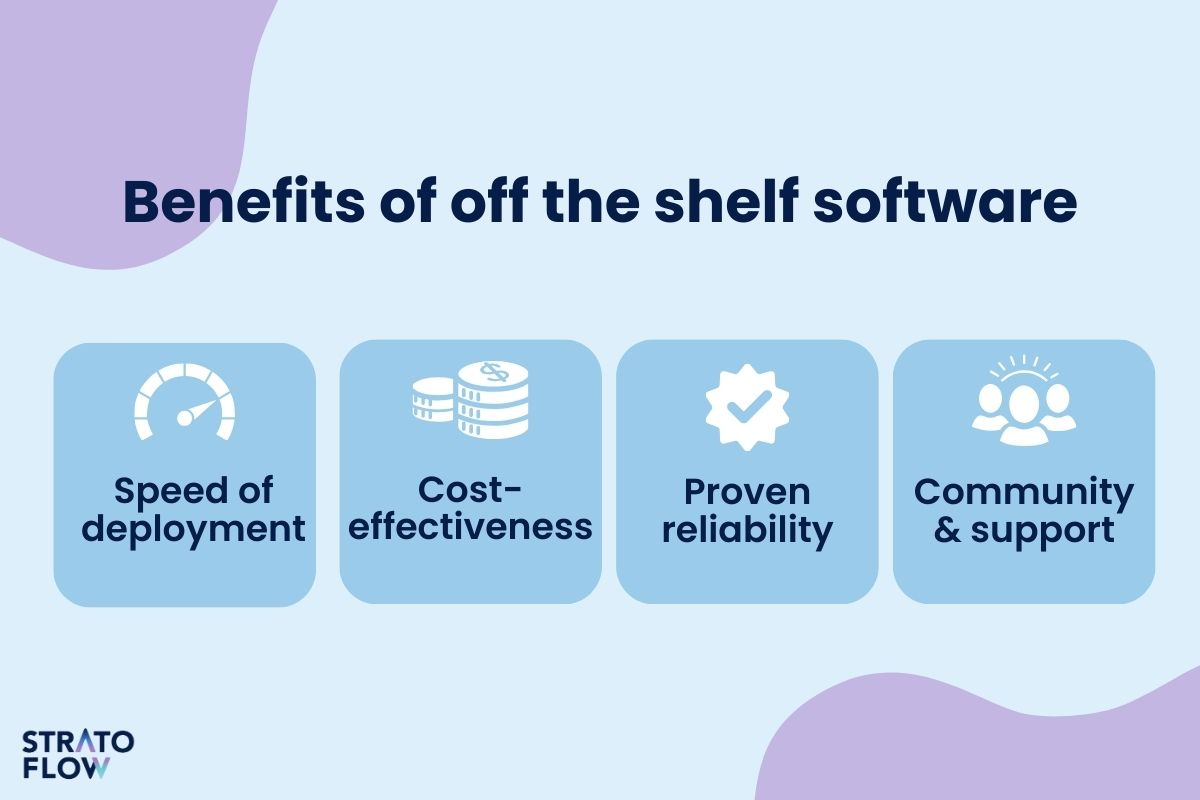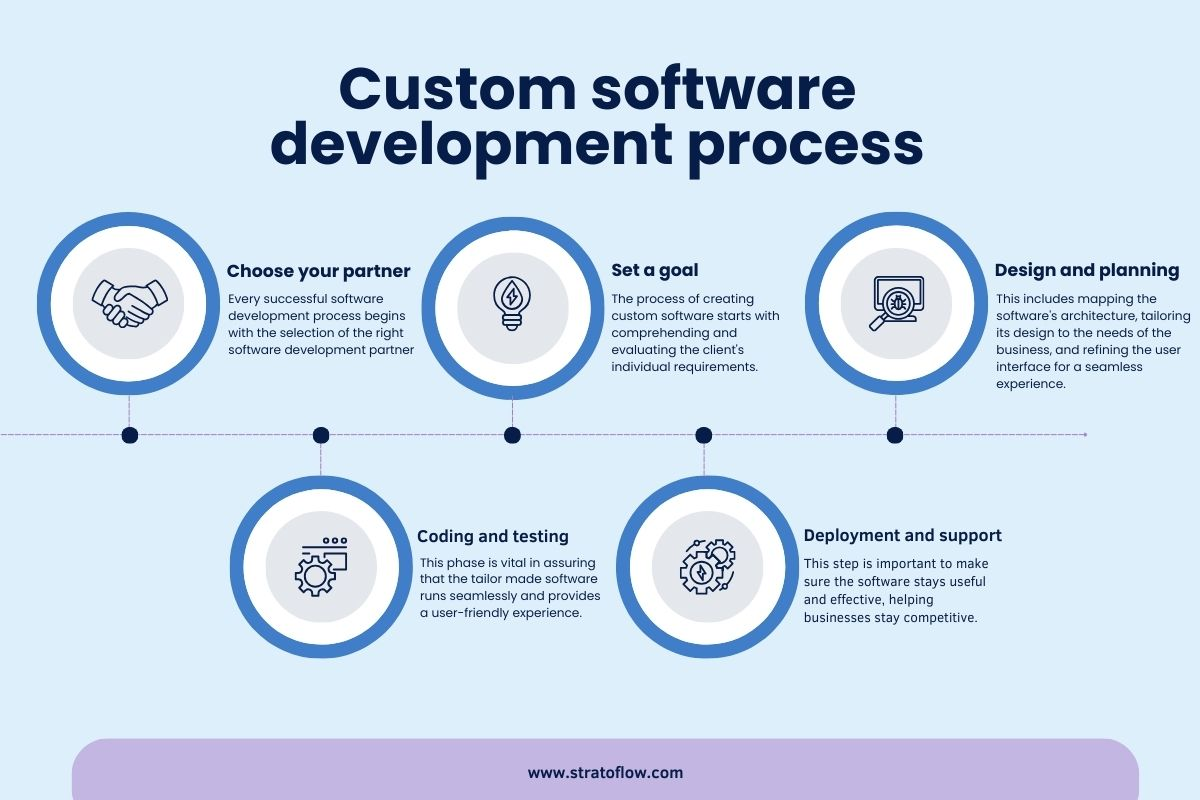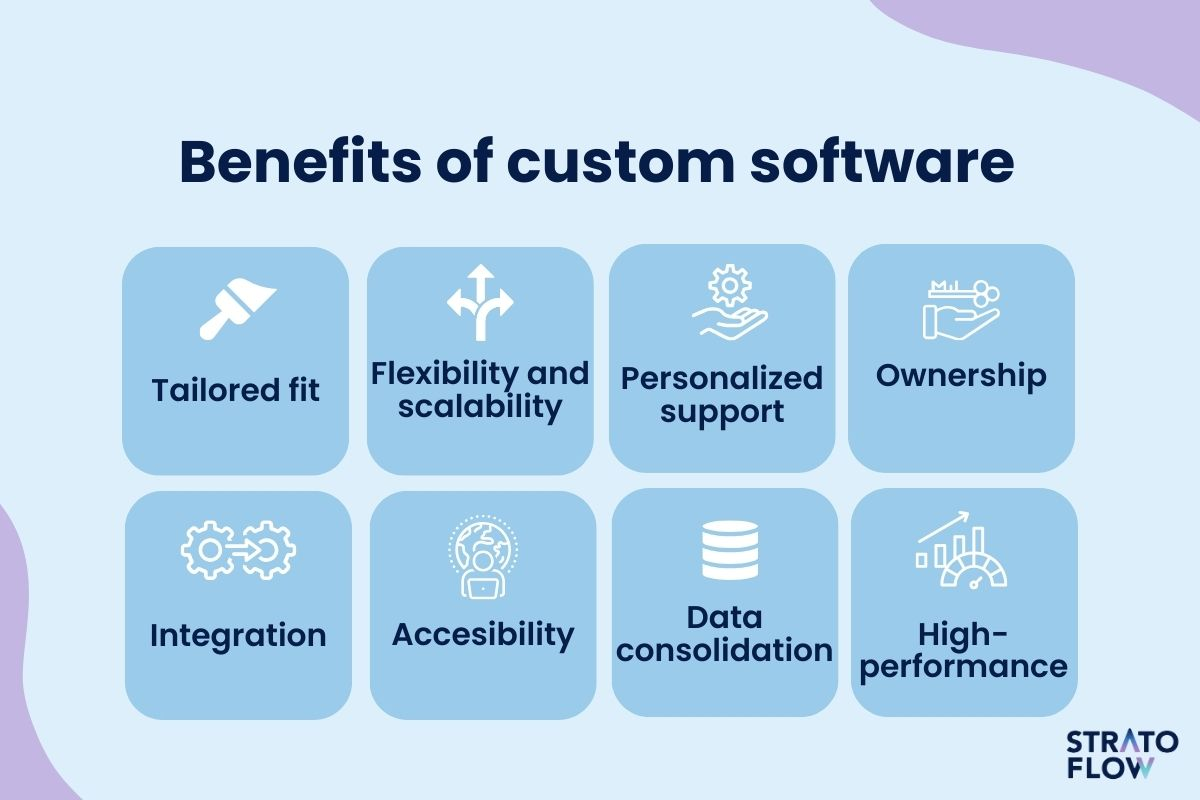
Off the Shelf vs Custom Software: Pros & Cons + Examples
In today’s era, companies have a crucial choice to make regarding powering their operations using software. Should they choose off-the-shelf solutions or invest in custom development? This article explores the complex world of software selection, comparing the bespoke precision of custom software with the broad accessibility of off-the-shelf options. We will discuss the pros and cons of each method, from the personalized and unique nature of custom development to the cost-efficiency and immediacy of off shelf software.
Contents
- What is off the shelf software?
- Advantages of off the shelf software
- Disadvantages of off the shelf software
- Examples of off the shelf software solutions
- What is custom software?
- Custom software development process
- Advantages of custom software
- Disadvantages of custom software
- Custom software examples
- Openkoda: the alternative that combines benefits of off the shelf and custom software
What is off the shelf software?
Off-the-shelf, or out-of-the-box, software is a pre-packaged and commercially available software solution designed to serve a broad audience with common needs. Unlike custom software, which is designed to meet the specific needs of a particular company or user, off-the-shelf software solutions are ready-made and can be used by anyone who buys them.
This type of software solution is typically developed by companies to address the most common tasks and needs of potential users. It is sold as is, with the same features available to all customers.
The main advantages of off-the-shelf business software are its immediacy and cost-effectiveness. It can be deployed quickly and is generally less expensive upfront than custom software. This is because the software development budget is spread across a large number of users.
However, it may not be a perfect fit for each company’s unique processes, and the hidden costs of licensing, updates, and potential customization can add up over time.

Advantages of off the shelf software
Speed of deployment
Off-the-shelf software is typically ready for immediate use after purchase. This can be particularly advantageous for businesses that need a solution quickly and cannot afford the time required for custom software development.
Cost-effectiveness
The initial cost a packaged software is generally lower than custom-developed software. This is because the development costs are spread across multiple users, making it more affordable for each one.
Proven reliability
Since ready-made software is used by a large customer base, it tends to be well-tested and reliable. There’s a proven track record that you can examine, with established performance metrics and user feedback.
Community and support
A broad user base means a wider community for support. Users can benefit from community forums, user groups, and other resources where they can share insights and solutions.

Disadvantages of off the shelf software
Generic solution
Off-the-shelf software is designed to cater to the general needs of a wide audience. It means it may not fit the specific needs of your business perfectly.
Limited customization
While some off-the-shelf software allows for a degree of customization, there are inherent limitations to how much you can tailor it to your business processes. Over time, this could lead to inefficiencies or the need for additional solutions to fill the gaps.
Ongoing costs
The lower initial cost can be misleading. Many off-the-shelf solutions require ongoing subscription fees, maintenance costs, or charges for updates and support. Over time, these can add up, potentially making the software more expensive than a custom solution.
Compatibility and integration issues
Integrating off-the-shelf software with existing operating systems also can be challenging. There may be compatibility issues that require additional time and resources to resolve, which can negate the initial speed advantage.

No competitive differentiation
Using software that is readily available to any business, including your competitors, means you lose out on the opportunity to leverage technology as a unique selling point or competitive advantage.
Dependence on the vendor
Your business becomes dependent on the software vendor for updates, support, and the future direction of the product. If the vendor discontinues the product or goes out of business, it could pose significant risks to your business operations.
Examples of off the shelf software solutions
One of the most common off-the-shelf software solutions used across various industries for enterprise applications is:
- Microsoft Office Suite: This is one of the most prevalent off-the-shelf software packages, including widely-used applications like Microsoft Word for document creation, Excel for spreadsheets, PowerPoint for presentations, and Outlook for email communication.
- Salesforce: Salesforce is a customer relationship management (CRM) platform that offers a suite of tools for sales, customer service, marketing automation, analytics, and application development, designed to serve businesses of all sizes.
- QuickBooks: QuickBooks by Intuit is a comprehensive accounting software package used by small to medium-sized businesses for managing invoices, tracking expenses, payroll processing, and financial reporting.
What is custom software?
Custom software, also known as bespoke software or customized software, is made for a specific business or organization to meet their unique needs and operations. Unlike off-the-shelf software, custom software is built from scratch to fit your business’s specific preferences, workflows, and integration requirements. This makes sure that the software aligns closely with your business strategies and processes, and such software can evolve with your organization over time.
Custom software development process
To better comprehend the differences between custom software vs off-the-shelf solution, let’s take a closer look at what the entire custom software development process looks like.
1. Choose the right software partner
Every successful software development process begins with the selection of the right software development partner, a company that not only aligns with your business values, but also has the capability to deliver the right software solution. This critical selection step sets the tone for the entire project.
After reviewing offers and evaluating the cost of software development you select a software development company that meets your criteria. The next formal step is to sign a software development agreement. This agreement starts the process and lists the terms, responsibilities, and expectations for both parties.
It leads to the development of your custom built software.
[Read also: How to choose the right software development company

2. Set a goal
The process of creating custom software by a software development company starts with a crucial step: comprehending and evaluating the client’s individual requirements. This primary phase is necessary for producing software that matches the client’s exact specifications.
During this stage, software developers have thorough conversations with the client to understand their:
- Particular needs
- Corporate objectives
- Projected software results
This collaborative effort creates a detailed plan that includes:
- scope of the project
- development approach
- programming languages
- timelines
- technology stacks
- necessary resources
This phase of development of custom made software is crucial to ensure that the client’s expectations are met or exceeded.
3. Software design and planning
Moving forward, the process of making customized software enters an important stage of careful design and planning.
This includes:
- creating a detailed map of the software,
- outlining its elements, features, and user interfaces,
- customizing the design for the specific needs of the business,
- ensuring that the user experience is smooth and easy-to-use.
By working closely with the client and receiving frequent input, the dedicated team can create a design that is both practical and visually appealing.
Additionally, the software’s architecture plays a crucial role in constructing it on a sturdy framework with a clear structure of all its components and connections.
[Read also: Software development methodologies]

4. Coding and testing
After finalizing the design and architecture, the development team moves on to the construction and thorough testing of the software.
The coding process begins here with the introduction of functional programming. This allows the design to be implemented while maintaining quality standards.
This phase is vital in assuring that the tailor made software runs seamlessly and provides a user-friendly experience.
Before the software is officially released, thorough testing is performed to find and fix any problems or security vulnerabilities. Prioritizing testing and quality assurance by a service provider helps companies minimize the possibility of software malfunctions and potential operational disruptions.
5. Deployment and ongoing support
The final step in creating custom software is deploying it and keeping it maintained. In this stage of custom software development services, the software is officially released and becomes an integral part of the business’s operational ecosystem.
Alongside deployment, comprehensive software documentation is developed and provided. This documentation serves as a roadmap for users and maintainers, detailing the software’s functionality, configuration, and troubleshooting procedures. It is an essential tool for enabling users to understand and effectively utilize the software, as well as for developers to maintain and update the system efficiently.
The development team is available to provide ongoing support and updates.
This step is important to make sure the software stays useful and effective, helping businesses stay competitive. By providing thorough guides and training to users, companies can make the most of their customized software, resulting in a solid return on investment.

[Read also: Future of software engineering]
Advantages of custom software
Tailored fit
Custom software is designed to fit an organization’s unique business processes. This means that every feature and function is designed to support the specific workflows, user roles, and business rules that are unique to the organization. Unlike off-the-shelf software, which can force an organization to adapt its processes to the software, custom software adapts to the organization and offers complete personalization.
Flexibility
As your business evolves, custom software can be easily modified and expanded to keep pace with changes in your business and technology. This adaptability ensures that the software remains relevant and useful over the long term.
Competitive advantage
Custom enterprise software is unique to your business, giving you a competitive edge over others in your industry. It provides functionality not available to your competitors, potentially giving you a significant advantage in efficiency and innovation.
Ownership
With custom written software, you own the solution outright. This means you have complete control over the software and can decide how it is used, modified, or expanded without restrictions.
Long-term cost benefits
Although custom software may require a larger up-front investment, it can lead to greater efficiencies and cost savings over time. Unlike off-the-shelf solutions that may require ongoing subscription fees, a custom solution can be more cost-effective in the long run.
Personalized support
Working with a custom software provider often means more personalized support. They have a deeper understanding of your business and can provide tailored support, which can be invaluable in maintaining your existing systems and enhancing the software.

Scalability
As a business grows, its software needs may change. Custom software with personalized features can be designed with scalability in mind, ensuring that the software can grow and adapt as the business evolves, without the need for a complete overhaul.
Integration with other systems
Custom solutions can be made to easily integrate with the software and tools your company already uses. Seamless integration allows data to move effortlessly between systems, lessening the need for manual data entry, decreasing errors, and saving time.
Streamline business automation
Custom software development focuses on streamlining your business by automating mundane and repetitive tasks. By creating custom automations, integrating disparate data sources into a unified system, and connecting to third-party applications, your software partner helps you save time and energy so you can focus on the core aspects of your business that drive growth and revenue. Let a software development company help guide you through the digital transformation.
Accessibility
With custom software designed for cloud-based operations, you give your team the flexibility to access business systems from anywhere. This accessibility, backed by robust security measures, gives your employees the choice to work from where they are most productive, improving work-life balance and potentially increasing job satisfaction.
Data consolidation
Eliminate the chaos of managing multiple spreadsheet versions. Custom software development ensures that your data is stored, updated, and managed in a consistent and organized manner. Embrace the modernization of your existing software or business processes and leave outdated methods behind for a more streamlined and error-free data management system.
Improved business intelligence
Recognizing the critical role of data in strategic decision-making, custom software solutions are designed to deliver powerful, data-driven insights. These systems enable you to access real-time business metrics in one place, ensuring you have the timely and accurate information you need to make informed decisions.
High-performance solutions
Custom software development focuses on creating fast and efficient computing solutions that meet your business needs.
The software is custom-built for high-performance and resource efficiency, striving to exceed speed and performance expectations in the fast-paced digital world. Even a millisecond can impact productivity and user experience, making optimal software crucial. This is accomplished by using the most efficient and eco-friendly programming languages, keeping the environment in mind. This provides businesses with a competitive advantage that is both technologically advanced and environmentally friendly.
[Read also: Latest software development trends]

Disadvantages of custom software
Higher upfront investment
Customized software development requires a significant upfront investment due to the resources required to develop it from scratch. This can be a significant financial commitment, especially for small or medium-sized businesses.
Longer development time
The process of developing custom software can be lengthy, often taking several months. This timeframe may not be feasible for companies that need an immediate solution. However, you can learn how to speed up the software development process.
Potential developer dependency
Custom software can create a dependency on the original developers for updates, support, and maintenance. If the vendor becomes unavailable or goes out of business, the continued use and functionality of the software could be at risk.
Risk of complexity
With the ability to customize every aspect of the software, there’s a risk of creating a solution that is too complex or difficult to use without extensive training.
Maintenance and support
Unlike off-the-shelf software, which often comes with a vendor-managed support structure, custom software may require a dedicated in-house team or ongoing support contract to manage and troubleshoot, which can increase the total cost of ownership.
Project risk
Custom software projects come with their own set of risks, including the potential for the project to go over budget, deliver late, or fail to meet business needs if not managed properly.

Custom software development statistics
According to Grand View Research, the global custom software development market size was valued at USD 29.29 billion in 2022. It is expected to expand at a compound annual growth rate (CAGR) of 22.4% from 2023 to 2030. It is estimated that 58% of the market belongs to the large, enterprise segment, and 36% of the market is the market share of only North America. According to GM Insights, the demand for tailored software solutions, such as Enterprise Resource Planning (ERP) systems, is propelling custom software market growth.
On average, custom software development costs from 30000 USD for small-scale projects to over 1000000 USD for large enterprise-grade software systems. Software development project takes roughly between one to nine months. On average, a custom software development project is expected to take about 5 months but some, large software projects can take years with constant updates and the addition of new functionalities.
Custom software examples
1. Custom software solution for finance
Secure and scalable Software as a Service (SaaS) financial platform a great demonstration of how creating custom software applications can address the unique needs of a specific industry, in this case – finance industry.
This custom built software can manage large and complex financial transactions and calculations, giving a client competitive edge.
This finance system was made to deliver features that other financial software can’t offer. It was created to ensure fast processing, handle growth without slowing down, and uphold high security for financial operations.
Custom software provides a unique solution, that perfectly matches business needs, giving a competitive adventage in your industry. This case study highlights the benefits of customized options. Off-the-shelf software is useful and economical for general purposes, but custom software prioritizes performance, scalability, and security for industry-specific requirements.
Read entire case studies here: High-performance, horizontally scalable cloud platform for financial applications.
Another example is custom accounting software.
Such solution provides a structure that is finely tuned to a company’s unique financial management and reporting needs. It improves operational efficiency by streamlining specialized processes and minimizing the likelihood of manual errors.
Over time, these efficiencies will lead to additional cost reductions that may not be immediately apparent.
2. Customized solutions for travel
Another successful custom software development solution is a travel search engine created for a major hotel booking aggregator company.
This custom travel search engine can handle real-time price and availability calculations. It is designed to be highly scalable. It can easily process large amounts of data associated with travel bookings, such as flight prices and hotel room availability.
The custom product was made to not just handle a large amount of data but also guarantee that the information given to users is current and correct, which is crucial in the rapidly changing travel industry. This shows the strength of customized software when pre-made alternatives cannot fulfill the intricate needs of a specific business in travel industry.
If you want to learn more about this project, read our case studies: Travel search engine handling 300 million queries daily.

3. Custom software solutions for ecommerce
Let’s talk about custom solutions for ecommerce sector.
Another example proving that custom software can be indispensable is an ecommerce pricing engine that connects to outside pricing sources, providing the foundation for an omnichannel ecommerce platform. This complex system adjusts prices in real-time, keeping up with market trends and outside data.
The specially designed system helps the online shopping site offer the same prices in all mediums, including the website, the app, and physical stores. This ensures a smooth and understandable purchasing event for customers.
The example illustrates how custom software can make a significant difference in the world of business, specifically when dealing with dynamic, real-time data merging and the requirement for consistency in customer-facing interfaces. It shows how personalized software can be used to tackle particular business requires and difficulties, supplying a resolution that pre-packaged programs frequently cannot offer.
Read more: Real-time pricing engine integrated with external pricing feeds driving an omnichannel e-commerce platform.

Discover the difference with our experienced custom software development team, where we tailor solutions to meet your unique business needs with the agility and speed that sets us apart. Let’s build the software that moves your business forward, faster. Contact us today for a free consultation.
Openkoda: the alternative that combines benefits of off the shelf and custom software
We’ve looked at the pros and cons of both off-the-shelf and custom software. Now let’s explore Openkoda, a platform that combines the best of both worlds. It’s changing the game for building enterprise applications in Java, making the process much faster than traditional methods.
Openkoda provides out-of-the-box modules that simplify development like low-code platforms do, but it still allows for customization with less programming. Its special feature is an AI-powered engine that speeds up the creation of new, custom features and helps developers with an AI Companion.
A big benefit of Openkoda is that it doesn’t lock you into a single cloud service or vendor. Companies have full control over their code and can deploy their applications wherever they want. Openkoda is designed to build applications that are secure, can grow with your business, and can be developed quickly.
And most importantly, Openkoda works for many industries. It can build custom software for insurance companies, time management tools, legal tech, and more, making it a versatile choice for companies looking to lead in their field.
Want to give a try? Schedule a personalized demo.

Related Posts
- How to Build Insurance Policy Management Software: Expert Guidance
- How to Prepare a Successful Application Migration Project
- Best AI for Coding: 10 AI Tools and Assistants for Software Developers for 2024
- Software Development Process: Comprehensive Guide
- Complete Guide To Replatforming – Definition, Benefits, & Best Practices
We are Stratoflow, a custom software development company. We firmly believe that software craftsmanship, collaboration and effective communication is key in delivering complex software projects. This allows us to build advanced high-performance Java applications capable of processing vast amounts of data in a short time. We also provide our clients with an option to outsource and hire Java developers to extend their teams with experienced professionals. As a result, our Java software development services contribute to our clients’ business growth. We specialize in travel software, ecommerce software, and fintech software development. In addition, we are taking low-code to a new level with our Open-Source Low-Code Platform.
